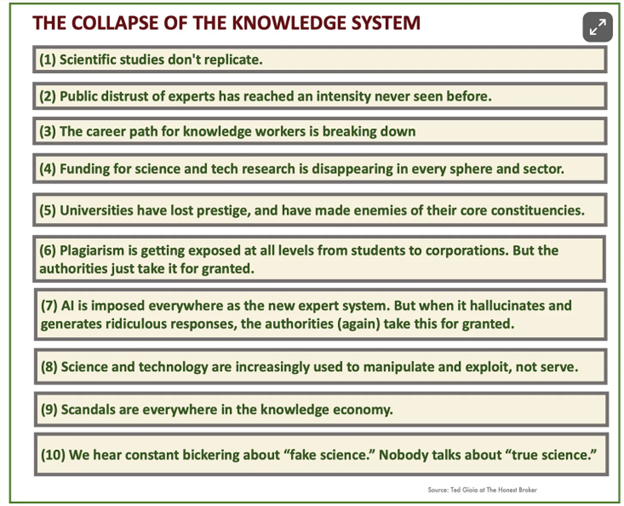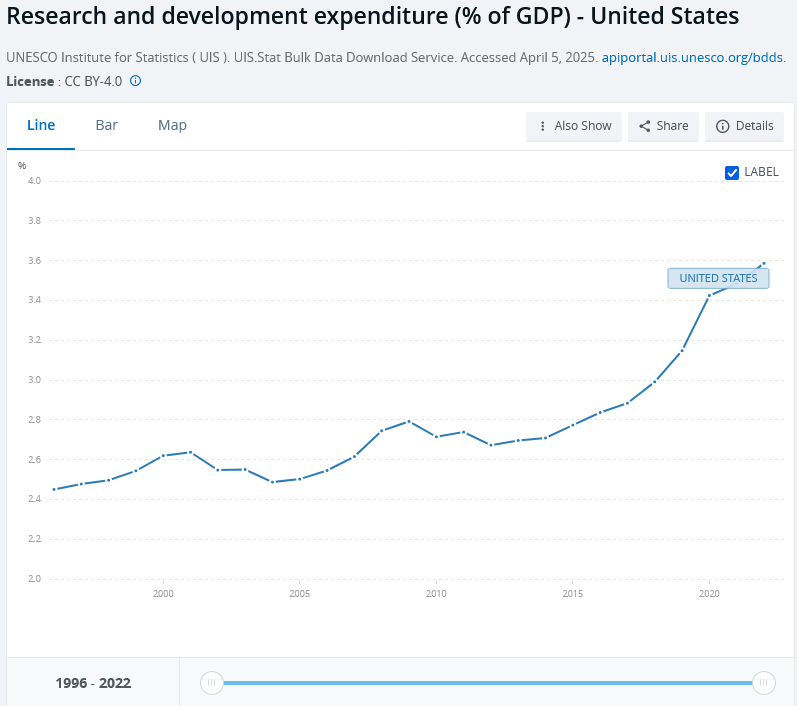Apocalypse Now?
Lions and Tigers and Bears….oh, my.
No one who reads this blog regularly would call my a Pollyanna….or a Pangloss [hands up, who’s read Candide?]. I do not think we live in the best of all possible worlds, and write regularly about what I think is wrong with many of our institutions and decision-makers. This leads me to read things that are not the usual mainstream media, but to stay completely away from anything that might be considered ‘social media’. One site I read regularly is The Free Press (https://www.thefp.com/), because I find it provides news stories I don’t see anywhere else, and a refreshing attitude: it makes fun of the ridiculous, no matter the source.
This does not mean that I love everything thefp publishes. Case in point, an article from June 10 titled “Our Knowledge System Has Collapsed. Can We Survive Without It?”, written by one Ted Gioia.
Ted Gioia is an American music writer, mostly about jazz. He is himself a jazz pianist, and I have two or three of his books on my shelf. I’ve learned a good deal about jazz from those books. Why such writing might make Gioia an expert on ‘knowledge’ is beyond me, but clearly the Free Press thinks so. The article is…..apocalyptic. It’s also pretty long, but below is a chart from the article which lists the 10 phenomena that lead him to claim ‘our knowledge system has collapsed’.

For this post, I will limit myself to his point 4 –
- Funding for science and tech is disappearing in every sphere and sector.
See what I mean about hyperbole?
This is a claim just crying out for some data, but none is provided. Yes, we all know that Trump has been loudly pulling research funding from some universities, so there is no doubt something to this claim as regards US federally funded research. But – every sphere and sector?
Below is a graph depicting gross public and private R and D spending for the US as a percentage of GDP.

Notice that this is R&D funding in the US as a percentage of GDP, and the chart says that percentage has been increasing steadily right up through 2022.
If a funding apocalypse is upon us, it is very recent. But is it?
Here’s a quote from the website rdworldonline.com, which tracks these kinds of expenditures.
For 2024, R&D World’s editors forecast that $2.53 trillion will be invested globally in R&D, which represents an 8.3% increase over the 2022 forecast. The report notes: “In general, countries are increasing their R&D intensity over time, which means that R&D is increasing both through growing GDP and the growing share of GDP.”
So, really really recent. Like, this last couple of months.
The US Federal government is an important, but far from the only, source of funding for science and tech. Yea, the Orange Guy has made a big headline-grabbing point of pulling federal money from universities, and is reducing federal funding of research generally. Those are not good things, perhaps, but they are not the whole story, and I expect more than a reaction to headlines from writers in The Free Press.
So, where does this apocalyptic vision about science and tech funding of Gioia’s come from, given the data above? In the article he writes this:
“This is more than just a change in government policy. Even the huge corporations that fund their own research programs are now investing in AI data centers, not scientists. Somebody should measure this, but I’m confident that the shift from human-driven R&D projects to capital equipment investing is enormous.”
Needless to say, that Ted is ‘confident’ of this hardly constitutes evidence. He points to reductions in tech staff at Microsoft, Meta and Google, and that is some evidence of a shift from spending on people to spending on other things, perhaps AI. That is indeed something that might be important, but it is not evidence that his apocalyptic point 4 has anything to it. It is telling that he does not point at any evidence that those companies are reducing spending on R&D, which is what his point 4 implies is happening.
I think the above-mentioned tech companies are largely evil, honestly, so I am inclined to watch carefully what they are up to. I might even think that a reduction in R&D by them was a good thing. I just don’t see any evidence that it is happening, so whether it is good or bad is moot.
So, my conclusion: If his point 4 was ‘some (well, three) tech companies are shifting spending from software engineers and other tech personnel to AI’ I would say there is at least some evidence that it’s true. But that doesn’t sound nearly so scary as what he wrote, does it?
I’ll be coming back to his other nine points in future posts, so stay tuned.